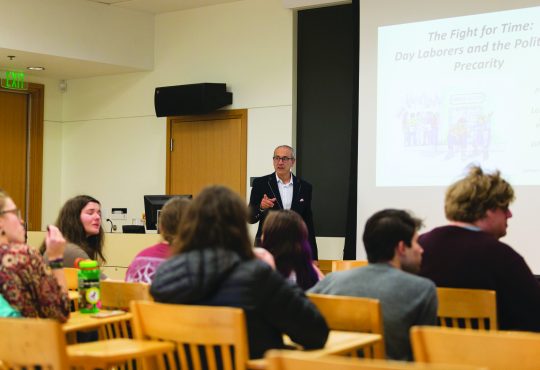As of Oct. 1, Americans can register for insurance plans under the Affordable Care Act. Students seeking health care insurance of their own will have to navigate an online health market to find coverage, which will take effect beginning in 2014.
The Affordable Health Care Act, also known as Obamacare, calls for widespread reforms to the healthcare system that are supposed to increase the accessibility and affordability of health insurance, reduce the number of uninsured people and lower the costs of healthcare.
For students not covered by their parents’ health insurance, the act is a new way to obtain individual health insurance. Obamacare also affects health benefits received from part-time jobs and the rate of insurance premiums.
“Obamacare and the Affordable Care Act are misnomers between healthcare and health insurance. The law is about insurance companies and how we get insurance,” senior Liam Tully said.
The Affordable Care Act is a combination of public and private insurance coverage that is organized through mandates, subsidies and insurance exchanges. The law requires insurance companies to grant coverage to all applicants, regardless of pre-existing conditions.
Healthcare.gov describes the healthcare mandate as necessary health coverage that most people will need to obtain or risk being charged a fee.
According to the site, “the fee in 2014 is one percent of your yearly income or $95 per person for the year, whichever is higher. The fee increases every year.”
Insurance exchanges are online marketplaces where people go to buy health insurance. They are designed for people who do not already have health insurance and do not qualify for Medicare or Medicaid. The exchanges are run by the states. They compile health insurance plans from multiple companies and allow users to have a customized approach to buying health insurance.
According to the Huffington Post, “more than a quarter of Americans in the 19-25-year-old range are uninsured. While they’ll be able to purchase coverage through the health insurance exchanges—many of them will get substantial subsidies to do so.”
Subsidies given by the government are a way that students without much disposable income can get insurance coverage at a lower cost.
Because the insurance exchanges and markets vary state by state, Puget Sound students who live in Washington will have different options than those living in California, or any other state.
With so many moving pieces to the Affordable Health Care Act, it is hard to keep track of what will affect whom. Many still question the meaning of Obamacare.
“No one really knows what it means—it’s still changing,” Tully said. “The thing that sets my BS meter off is Congress has passed this but refuses to apply the law for themselves. They use a completely different system.”
Based on input from the democratichub.com, the success of these insurance exchanges will be dependent on “young and able-bodied individuals” signing up for coverage in the marketplace. Having healthy bodies in the health insurance collective will allow insurance companies to offer lower rates.
Since the insurance companies can no longer deny coverage for pre-existing conditions, it is more of a guarantee for companies to have a broad range of younger users paying into the system.
“I think [Obamacare] is mostly good,” senior Chad Harper said. “It does expand coverage to about 30 million people [and] despite some of the misinformation that is out there, it does lower the deficit. I wish it did more to bring down the cost of healthcare in the US.”
One of the major differences for Puget Sound students and graduates is that they will have to switch off of their parents’ insurance after age 26.
“I think for most of them in the immediate time they will stay under their parents’ plan, or their jobs will provide it. I don’t see most Puget Sound students affected that drastically,” Harper said.
Students will also have to be more cautious when entering the job market. Part-time employers do not have to provide health insurance to their employees, whereas full-time employers do.
Part-time workers will have to buy health insurance on the online marketplaces unless they find coverage under the expanded Medicaid program. Employees still have the option to opt-out, but only after being charged the mandate fee.
Obamacare is riding on the need for young participants willing to pay into the online health insurance marketplaces.
In 2014, students may need to start considering how they will afford health insurance under this new system, and which insurance plan to pick from their home state.






